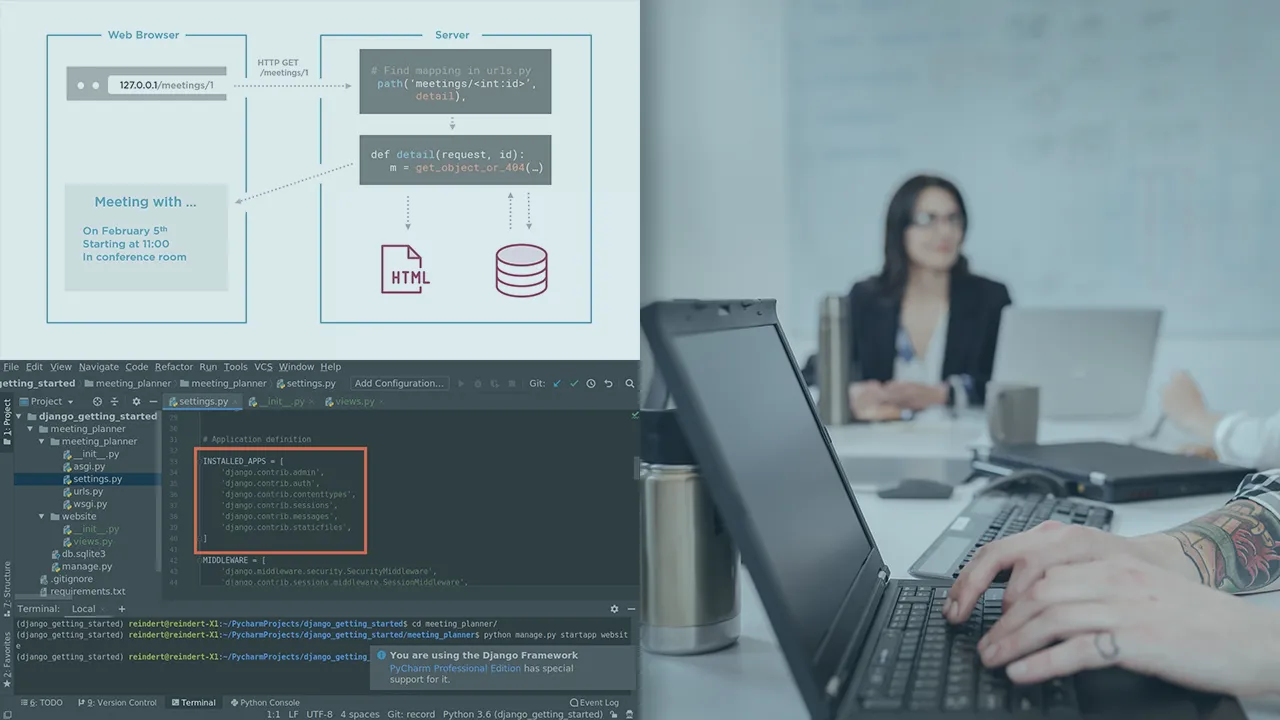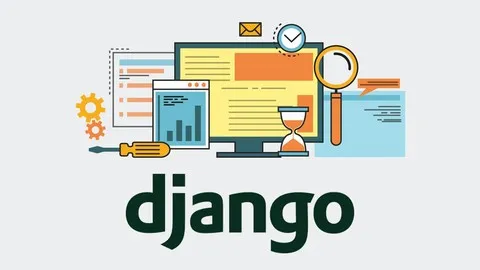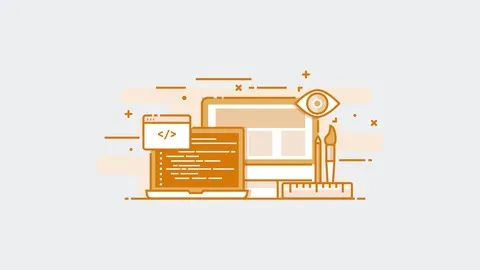
Django: Getting Started 
This course provides an introduction to Django and Python web development, teaching the fundamentals of building a web application with Django. Students will learn how to create a web application with less code and in less time, using the popular and mature Django framework. ▼
ADVERTISEMENT
Course Feature
![]() Cost:
Cost:
Paid
![]() Provider:
Provider:
Pluralsight
![]() Certificate:
Certificate:
No Information
![]() Language:
Language:
English
Course Overview
❗The content presented here is sourced directly from Pluralsight platform. For comprehensive course details, including enrollment information, simply click on the 'Go to class' link on our website.
Updated in [May 04th, 2023]
Welcome to Django: Getting Started! In this course, you will learn how to create your first Django web application. You will learn how to make a simple page that displays a short text message, how to make an HTML page with a Django template, and how to create a database model so that we can store and retrieve our data. You will also learn how to display that data on our pages, add CSS styling to your site, and use forms to allow a user to interact with our site.
Course Overview: This course will provide you with a comprehensive overview of the Django web framework. You will learn how to create a web application from scratch, how to make a simple page that displays a short text message, how to make an HTML page with a Django template, and how to create a database model so that we can store and retrieve our data. You will also learn how to display that data on our pages, add CSS styling to your site, and use forms to allow a user to interact with our site.
Possible Development Directions: After completing this course, you will have a good understanding of all the essential parts of Django and how they interact with one another. This will allow you to go on and build your own Django websites. You will also be able to explore more advanced topics such as authentication, authorization, and security.
Related Learning Suggestions: To further your knowledge of Django, you may want to explore other courses such as Django REST Framework, Django Channels, and Django Security. Additionally, you may want to look into other web frameworks such as Flask and Ruby on Rails. Finally, you may want to look into web development best practices such as version control, testing, and deployment.
[Applications]
After completing this course, students should be able to apply their knowledge of Django to create their own web applications. They should be able to create HTML pages with Django templates, create a database model to store and retrieve data, add CSS styling to their site, and use forms to allow users to interact with their site. Additionally, they should have a good understanding of how all the essential parts of Django interact with one another.
[Career Paths]
1. Web Developer: Web developers use Django to create dynamic websites and web applications. They are responsible for designing, coding, and maintaining websites and web applications. They must have a strong understanding of HTML, CSS, JavaScript, and other web development technologies. As the demand for web applications continues to grow, web developers with Django experience will be in high demand.
2. Database Administrator: Database administrators use Django to manage and maintain databases. They are responsible for designing, implementing, and maintaining databases. They must have a strong understanding of database design, SQL, and other database technologies. As the demand for data-driven applications continues to grow, database administrators with Django experience will be in high demand.
3. Software Engineer: Software engineers use Django to create software applications. They are responsible for designing, coding, and maintaining software applications. They must have a strong understanding of software engineering principles, object-oriented programming, and other software development technologies. As the demand for software applications continues to grow, software engineers with Django experience will be in high demand.
4. DevOps Engineer: DevOps engineers use Django to automate the deployment and management of web applications. They are responsible for designing, implementing, and maintaining the infrastructure that supports web applications. They must have a strong understanding of DevOps principles, cloud computing, and other DevOps technologies. As the demand for cloud-based applications continues to grow, DevOps engineers with Django experience will be in high demand.
[Education Paths]
1. Bachelor's Degree in Computer Science: A Bachelor's Degree in Computer Science is a great way to gain a comprehensive understanding of the fundamentals of computer science and software engineering. This degree will provide you with the skills and knowledge necessary to develop web applications using Django. You will learn about programming languages, databases, operating systems, and software engineering principles. Additionally, you will gain an understanding of the principles of web development, including HTML, CSS, and JavaScript.
2. Master's Degree in Web Development: A Master's Degree in Web Development is a great way to gain a deeper understanding of web development and the Django framework. This degree will provide you with the skills and knowledge necessary to develop complex web applications using Django. You will learn about advanced programming languages, databases, operating systems, and software engineering principles. Additionally, you will gain an understanding of the principles of web development, including HTML, CSS, JavaScript, and AJAX.
3. Certificate in Django Development: A Certificate in Django Development is a great way to gain a comprehensive understanding of the Django framework. This certificate will provide you with the skills and knowledge necessary to develop web applications using Django. You will learn about programming languages, databases, operating systems, and software engineering principles. Additionally, you will gain an understanding of the principles of web development, including HTML, CSS, and JavaScript.
4. Data Science Degree: A Data Science Degree is a great way to gain a comprehensive understanding of the fundamentals of data science and software engineering. This degree will provide you with the skills and knowledge necessary to develop web applications using Django. You will learn about programming languages, databases, operating systems, and software engineering principles. Additionally, you will gain an understanding of the principles of data science, including machine learning, data mining, and data visualization. This degree is becoming increasingly popular as data science is becoming more important in the development of web applications.
Course Syllabus
Creating a Django App
Adding a Page
When It Doesn't Work
Django and the Flow of Control
Adding an About Page
Course Provider

Provider Pluralsight's Stats at AZClass
Pluralsight ranked 16th on the Best Medium Workplaces List.
Pluralsight ranked 20th on the Forbes Cloud 100 list of the top 100 private cloud companies in the world.
Pluralsight Ranked on the Best Workplaces for Women List for the second consecutive year.
AZ Class hope that this paid Pluralsight course can help your Django skills no matter in career or in further education. Even if you are only slightly interested, you can take Django: Getting Started course with confidence!
Discussion and Reviews
0.0 (Based on 0 reviews)
Explore Similar Online Courses

GMAT Reading Comprehension Practice

IELTS Speaking Pro 7+ English Language

Python for Informatics: Exploring Information

Social Network Analysis

Introduction to Systematic Review and Meta-Analysis

The Analytics Edge

DCO042 - Python For Informatics

Causal Diagrams: Draw Your Assumptions Before Your Conclusions

Whole genome sequencing of bacterial genomes - tools and applications

Django 22 & Python The Ultimate Web Development Bootcamp

Complete Python Django Single-Page App

Django Takeoff: Developing Modern Applications
 Related Categories
Related Categories
 Popular Providers
Popular Providers
Quiz
 Submitted Sucessfully
Submitted Sucessfully
1. What is the main goal of this course?
2. What will you learn in this course?
3. What will you be able to do after completing the course?
4. What is the main purpose of this course?
Correct Answer: To learn how to create a Django web application.


Start your review of Django: Getting Started